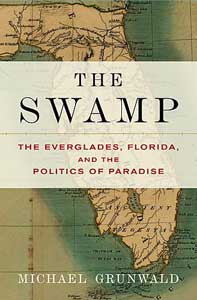![[whitespace]](/gifs/whiteline2.gif) |
Book Box

The Swamp: The Everglades, Florida and the Politics of Paradise
Sometimes it seems that humans just ruin everything they touch. In the early 19th century, as Florida's new ruler, the United States, was trying to empty the former Spanish territory of the Seminole tribes, no more than a few dozen white people called south Florida home. The Everglades was just a huge swamp. By 2000, there were 7 million residents and nearly six times that number of tourists coming through every year. The phenomenal growth of the area has had a devastating effect on the Everglades—which has been drained, filled and polluted in the name of progress—and its indigenous wildlife. In this page-turner, Washington Post reporter Michael Grunwald describes how in a rare moment of bipartisanship, Democrats and Republicans got together at the end of former President Bill Clinton's tenure to reverse the damage this encroachment had cost, launching the biggest environmental project in American history. In the process, Grunwald spins a vast and profoundly enlightening history of the region, showing how the very forces that ruined the Everglades are now being employed to resurrect its grandeur. Success is not assured. "Most of all, the Everglades is a moral test," Grunwald writes. "It will be a test of our willingness to restrain ourselves, to share the Earth's resources. ... If we pass, we may deserve to keep the planet." (By Michael Grunwald; Simon & Schuster; 464 pages; $27 cloth)
John Freeman

Return to Wild America: A Yearlong Search for the Continent's Natural Soul
About a half-century ago, famed birder Robert Tory Peterson and naturalist James Fisher toured North America counting flora and fauna; the 100-day, 30,000-mile dash was written up as Wild America. Fifty years later, Scott Weidensaul duplicated the feat, taking the pulse of the continent's natural heritage in the process. His journey starts at the murre rookeries of Newfoundland and scoots south along the Atlantic coast (with forays to the Great Smoky Mountains and Shenandoah National Park) to the Everglades. After a rugged hike through the Sierra Madre range of eastern Mexico, looking for jaguarundis and wolves (the area encompasses animals of both the temperate zone and the tropics), Weidensaul heads up the Pacific shore, stopping to visit the contentious salmon runs of the Klamath River, finally ending at the auklet havens of the Bearing Sea. Weidensaul teeters between awe at what remains of the great flocks and herds, aided in many cases by the preservation causes of the 1960s and '70s, and deep concern about environmental degradation presided over by the Bush administration with "a yawn of denial and inaction." Throughout, Weidensaul proves an astute and even poetic observer of fur and feather: "Roseate terns, starkly white with long forked tails that twisted gently in the breeze like streamers, flew past us." It isn't necessary to read the original to appreciate Weidensaul's melancholy achievement, and Return to Wild America should be by your side the next time some nitwit like Rep. Richard Pombo starts pontificating about gutting the Endangered Species Act. (By Scott Weidensaul; North Point Press; 394 pages; $26 cloth)
Michael S. Gant
Send a letter to the editor about this story to letters@metronews.com.
[ Silicon Valley | Metroactive Home | Archives ]
|
![[Metroactive Books]](/books/gifs/books468.gif)

